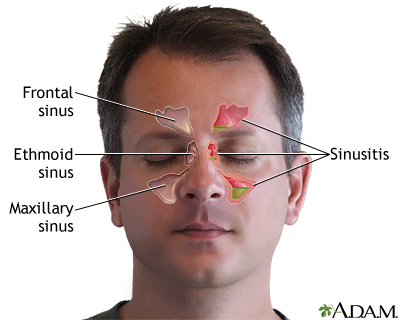Sinusitis

What is Sinusitis?
Sinusitis, also known as a sinus infection, is an inflammation or swelling of the tissue lining the sinuses. The condition can be acute (short-term) or chronic (long-term, typically lasting 12 weeks or more). When sinuses become blocked and filled with fluid, bacteria can grow, causing an infection.
Who’s at Risk for Sinusitis?
Risk factors for sinusitis include having a prior respiratory infection, such as a cold, allergies that cause nasal congestion, a deviated septum, nasal polyps, or a weak immune system due to conditions like HIV or diabetes.
What Causes Sinusitis?
Sinusitis is often caused by a viral infection, but it can also result from a bacterial or fungal infection. Other potential causes include allergies, nasal polyps, a deviated septum, or tooth infections.
How Does Sinusitis Start?
Sinusitis usually starts with inflammation or swelling in the sinuses, often due to a viral infection like the common cold, an allergic reaction, or an irritant in the environment.
What are the Symptoms of Sinusitis?
Common symptoms of sinusitis include a runny or stuffy nose, facial pain or pressure, loss of smell, cough or congestion, and possibly a fever. Chronic sinusitis might be diagnosed if these symptoms persist for 12 weeks or longer.
How is Sinusitis Diagnosed?
Sinusitis is often diagnosed based on a physical exam and a discussion of symptoms. Your doctor might also order imaging tests, like a CT or MRI scan, to get a better look at your sinuses.
How Can Sinusitis be Treated?
Treatments for sinusitis may include nasal sprays, antibiotics (if bacteria is the cause), and in some cases, surgery. Home remedies like applying a warm compress to the affected area, inhaling steam, or using a humidifier can also provide relief.
What Complications May Occur with Sinusitis? If left untreated, sinusitis can lead to serious complications, including an infection that spreads to the eyes, bones, skin, or brain.
How Can I Prevent Sinusitis?
Preventing sinusitis often involves reducing risk factors: stay away from allergens, avoid smoking, and manage chronic conditions that might affect your sinuses. Regularly washing your hands can prevent the spread of respiratory viruses.
Long-term Management of Sinusitis
Long-term management of sinusitis may involve regularly using nasal sprays, managing allergies, and possibly having surgery to correct any underlying issues causing the sinusitis.
What is Recent Research Saying About Sinusitis?
Recent research on sinusitis is exploring new treatments, including the role of fungi in sinusitis and the effectiveness of different types of sinus surgery.
Where Can I Go For More Information on Sinusitis?
For more information on sinusitis, you can visit websites like the American Academy of Otolaryngology-Head and Neck Surgery or the American Rhinologic Society.

